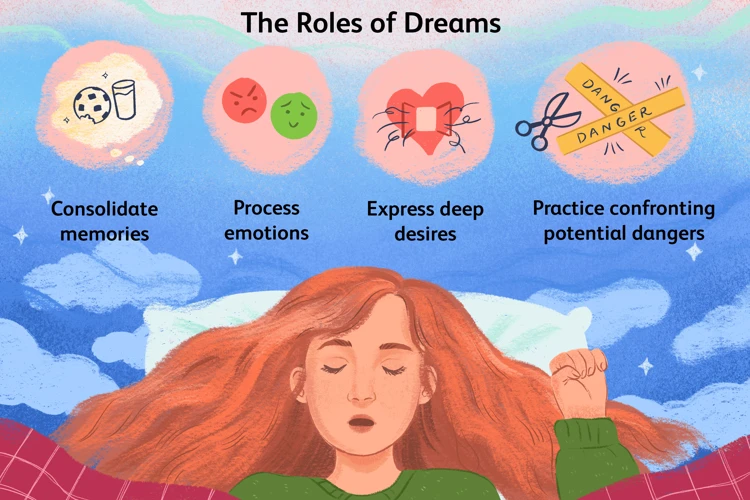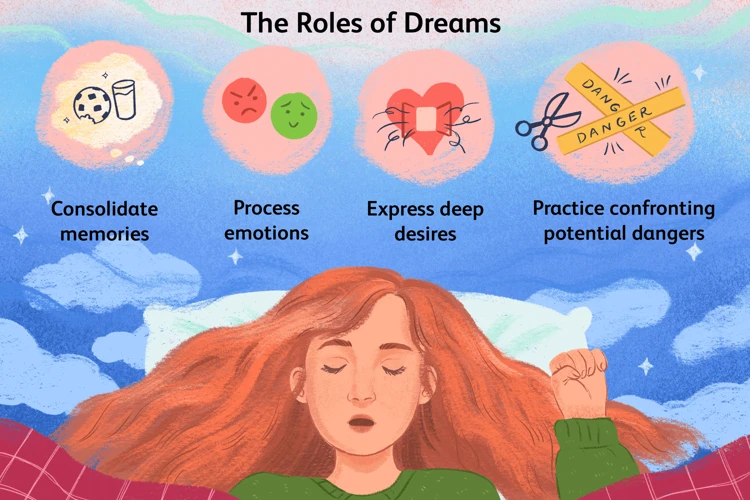Have you ever found yourself waking up from a dream, only to be left wondering about its meaning and significance? Dreams have long fascinated people, and psychologists have dedicated countless hours to understanding their inner workings. In this article, we will delve into the complex world of dreams and psychology, specifically analyzing the dreams that involve a specific person. We will explore the role of dreams in psychological processes and the common symbols and themes that often appear. We will uncover the psychological connection between dreams and our unconscious desires and emotions. Finally, we will provide tips for dealing with recurring dreams about someone. So, get ready to dive into the mysterious realm of dreams and discover the hidden messages they hold.
Understanding Dreams and Their Significance

Dreams have fascinated humans for centuries, and understanding their significance is a topic that continues to captivate many. In the realm of psychology, dreams are seen as a window into our subconscious mind, providing valuable insights into our thoughts, emotions, and desires. They serve as a playground for our imagination, allowing us to explore surreal scenarios and experience vivid sensations. While dreams can often seem illogical and confusing, they carry hidden meanings that can be uncovered with careful analysis. Whether it’s a dream about flying, being chased, or encountering fantastical creatures, each symbol and theme holds a unique message that can shed light on our innermost thoughts and concerns. By delving deeper into the interpretation of dreams, we can gain valuable self-awareness and gain a better understanding of ourselves. So, let’s embark on this journey into the mysterious world of dreams and unlock the secrets they hold.
The Role of Dreams in Psychological Processes
Dreams play a crucial role in various psychological processes, providing a rich source of information about our inner world. One significant function of dreams is their ability to facilitate memory consolidation and learning. During REM sleep, which is when most vivid dreaming occurs, the brain processes and organizes information from the previous day, strengthening important memories and discarding irrelevant ones. This consolidation process helps optimize our cognitive functioning and improves our ability to retain information. Additionally, dreams serve as a means of emotional processing and regulation. They provide a safe space for us to process intense emotions, such as fear, anxiety, and desire. By experiencing these emotions in a dream context, we can explore and work through them without the same real-life consequences. Dreams also have a problem-solving function. Oftentimes, when faced with complex challenges or decisions, our dreams offer creative insights and alternative perspectives that we may not have considered while awake. They can provide solutions, guidance, and inspiration for navigating real-life situations. So, as we can see, dreams serve as a valuable tool for memory consolidation, emotional processing, and problem-solving, helping us in our psychological development and understanding of ourselves.
Common Symbols and Themes in Dreams
In the realm of dreams, common symbols and themes frequently emerge, painting a vivid picture of our subconscious mind. These symbols can vary greatly from person to person but often include elements such as water, animals, and transportation. Water, for example, may symbolize emotions, representing the depths of our feelings and their fluid nature. Animals often carry symbolic meanings based on their characteristics; a snake may signify transformation or hidden fears, while a bird may represent freedom and spiritual aspirations. Transportation in dreams can represent the direction and speed of our life journey. These symbols and themes act as a language of the subconscious, providing clues to our innermost thoughts and desires. While these symbols can have universal meanings, it’s important to remember that personal experiences and cultural backgrounds can also influence their interpretations. By paying attention to these symbols and reflecting on their potential significance in our lives, we can begin to unravel the hidden messages contained within our dreams.
Interpreting Dreams About a Specific Person

When it comes to interpreting dreams about a specific person, there are several factors to consider. The content of our dreams is influenced by various elements, including our current emotional state, past experiences, and personal relationships. Dreams involving someone we know can hold significant meaning and provide insights into our subconscious desires, conflicts, or unresolved issues. Analyzing recurring dreams about a specific person can further shed light on the nature of our relationship with them. While there is no one-size-fits-all interpretation, common themes such as intimacy, conflict, or loss may emerge, offering clues to the underlying dynamics at play. It’s important to approach dream interpretation with an open mind and consider the context of the dream as a whole. By reflecting on the symbolism and emotions evoked by dreams about a specific person, we can gain a deeper understanding of ourselves and our connections with others.
Factors That Influence Dream Content
Dreams are highly influenced by a variety of factors that shape their content. One of the primary factors is our daily experiences and interactions. Our dreams often incorporate elements from our waking life, such as people we’ve met, events we’ve experienced, or places we’ve visited. Another influential factor is our emotions and mental state. If we are feeling stressed, anxious, or excited, these emotions can manifest in our dreams and influence their themes and narratives. Additionally, our subconscious mind plays a crucial role in dream content. It stores memories, desires, fears, and unresolved issues that can find their way into our dreams. The meanings behind these elements may not always be obvious, but they provide valuable insights into our inner world. By analyzing these factors and their interplay, we can gain a deeper understanding of the messages our dreams are trying to convey. So, let’s explore the intricate web of influences that shape our dreamscapes and discover the hidden meanings within.
Possible Interpretations of Recurring Dreams Involving Someone
Recurring dreams involving a specific person can be particularly intriguing and leave us curious about their possible interpretations. These dreams may stem from various factors, such as unresolved emotions, relationship dynamics, or the influence of that person in our waking lives. While each dream is unique to the individual experiencing it, there are some common interpretations that can shed light on their meaning. Here are a few possible explanations for recurring dreams involving someone:
– symbolic representation of the person’s qualities or traits that we admire or desire
– unresolved conflicts or issues in the relationship that need addressing
– reflection of our own emotions or desires projected onto the person
– manifestation of subconscious fears or anxieties related to the person
– signifying the need for closure or resolution in the relationship
Remember, dream interpretation is subjective and personal, so it’s important to consider your own emotions, experiences, and the specific context of the dream. Exploring the symbolism and emotions evoked by these dreams can provide valuable insights into our own psyche and relationships.
The Psychological Connection: Unconscious Desires and Emotions

Our dreams not only reflect our conscious thoughts, but they also provide us with a glimpse into our unconscious desires and emotions. Often, our deepest longings and fears manifest themselves in dream imagery, allowing us to explore aspects of ourselves that may not be readily accessible in our waking lives. Dreams serve as a conduit for these hidden emotions, creating a psychological connection between our conscious and unconscious minds. For example, dreaming about a specific person can be indicative of unresolved feelings or unresolved issues in our relationships with them. These dreams act as a medium for us to process and explore our complex emotions, offering us a deeper understanding of ourselves and our relationships. By unraveling the psychological connection between our dreams and our unconscious desires, we can gain valuable insights into our emotional landscape and embark on a journey of self-discovery. So, let’s dive deeper into the symbolism and meaning behind the person in our dreams and explore the emotions they evoke.
The Role of Personal Relationships
In the realm of dreams, personal relationships play a significant role in shaping the content and emotions experienced during our nightly visions. Dreams often serve as a reflection of our interactions and connections with others, whether they be romantic partners, family members, or close friends. These dreams about people in our lives can offer valuable insights into our feelings, desires, and conflicts within these relationships. For example, dreaming about a loved one may signify feelings of affection, longing, or unresolved issues that need addressing. On the other hand, dreaming about someone who is mad at us can represent unresolved conflicts or feelings of guilt and remorse. Our dreams provide a unique lens through which we can examine the dynamics and complexities of our personal relationships, helping us gain a deeper understanding of ourselves and the connections we hold dear. So, pay close attention to the people who populate your dreams, as they may hold the key to unlocking important insights about your personal relationships.
Unresolved Issues and Complexes
Unresolved issues and complexes can often manifest themselves in our dreams, providing valuable insights into our psychological well-being. Dreams have a way of bringing unresolved conflicts to the surface, allowing us to confront and process them in a symbolic manner. These unresolved issues can stem from past traumas, unspoken words, or unexpressed emotions. When we dream about a specific person, it may indicate that there are unresolved feelings or conflicts between us and that individual. It could be a former partner, a family member, or a friend with whom we have unfinished business. Exploring these dreams can help us identify the underlying issues and provide an opportunity for healing and growth. Whether it’s a dream about reconciliation, confrontation, or forgiveness, our unconscious mind is urging us to address these unresolved matters and find closure. So, pay attention to these dreams and use them as a catalyst for self-reflection and personal development.
Dreams as a Reflection of Your Subconscious Mind

Your dreams can serve as a mirror into your subconscious mind, reflecting deeply-rooted desires, fears, and emotions. While the events and scenarios in dreams may seem fantastical or bizarre, they often carry symbolic significance that relates to your waking life. Paying attention to the symbolism and emotions evoked in your dreams can provide valuable insights into your true thoughts and feelings. For example, dreaming about someone who is mad at you could indicate unresolved conflicts or tensions in your waking relationships. Similarly, dreaming about adopting a baby boy may symbolize a desire for nurturing and growth in your life. By analyzing the symbolism and emotions present in your dreams, you can gain a deeper understanding of yourself and uncover hidden aspects of your subconscious. So, take a moment to reflect on your dreams, embrace their enigmatic nature, and discover the messages they convey.
Digging into the Symbolism of the Person in Your Dreams
When analyzing dreams that involve a specific person, it’s important to dig into the symbolism behind their presence. The person in your dream may not necessarily represent themselves, but rather symbolize aspects of your own psyche or emotions. Consider the qualities and characteristics associated with that person and how they relate to your own life. For example, dreaming of a close friend could symbolize a desire for companionship or support in your waking life. Alternatively, dreaming of a celebrity might reflect aspirations or desires for fame and success. It’s crucial to understand that dream symbolism is highly personal and can vary from person to person. By reflecting on the interactions and emotions evoked by the person in your dreams, you can gain valuable insight into your own subconscious desires and motivations. So, grab a dream journal and start deciphering the hidden messages behind the people who appear in your dreams.
Analyzing the Emotions Evoked by the Dreams
When analyzing the emotions evoked by dreams, it becomes evident that our sleeping mind has a powerful ability to stir up various feelings within us. Dreams can elicit a wide range of emotions, from joy and excitement to fear and sadness. It is crucial to pay attention to these emotional responses as they provide valuable clues to the underlying meanings behind our dreams. By examining the intensity and nature of the emotions experienced during the dream, we can better understand the emotional landscape of our subconscious mind. For example, if you wake up from a dream feeling a deep sense of loneliness, it could indicate a need for connection or a longing for companionship. On the other hand, if you feel empowered and confident after dreaming about having magical powers, it may signify a desire for control or a yearning to overcome obstacles. Analyzing the emotions evoked by our dreams allows us to gain a deeper insight into our innermost desires, fears, and unresolved emotions. So, let’s dive into the realm of emotions within our dreams and unravel their hidden significance.
Tips for Dealing with Recurring Dreams About Someone
Dealing with recurring dreams about someone can be both intriguing and perplexing. If you find yourself consistently dreaming about a specific person, here are some tips to help you navigate through the experience:
1. Journaling and Reflecting: Keep a dream journal and write down the details of your dreams as soon as you wake up. Reflect on the emotions, symbols, and themes that appear in your dreams. This can provide valuable insights into the underlying meaning and significance of your dreams.
2. Seeking Professional Help: If your recurring dreams are causing significant distress or if you’re unsure how to interpret them, consider seeking the guidance of a professional psychologist or therapist. They can provide a deeper understanding of the psychological implications and help you explore any unresolved issues or concerns.
3. Engaging in Self-Reflection: Take time to reflect on your personal relationship with the person featured in your dreams. Consider the dynamics, emotions, and unresolved conflicts that may exist. This introspection can offer insights into the unconscious desires, emotions, or thoughts that are surfacing through your dreams.
4. Exploring Lucid Dreaming Techniques: Lucid dreaming involves becoming aware that you are dreaming while you are still in the dream itself. By practicing lucid dreaming techniques, such as reality checks and setting intentions before sleep, you may gain more control over your dreams and potentially alter recurring dream patterns.
Remember, dream interpretations are highly subjective, and there is no one-size-fits-all approach. It is essential to trust your intuition and delve into the symbolism and personal significance of your dreams. By using these tips as guidance, you can navigate the realm of recurring dreams and gain a deeper understanding of yourself and your relationship with the person in your dreams.
Journaling and Reflecting on Dream Patterns
Journaling and reflecting on dream patterns can be a powerful tool for understanding the deeper meaning behind our dreams. When we consistently record our dreams in a journal, we create a valuable resource for analysis and self-reflection. By writing down the details of our dreams, including the people, places, and emotions involved, we can begin to identify patterns and recurring themes that emerge. Paying attention to these patterns can provide insights into our subconscious thoughts and emotions. Additionally, reflecting on our dream entries allows us to connect the dots and gain a better understanding of the messages our dreams are trying to convey. It’s important to approach dream journaling with an open mind and a willingness to explore the symbolism and significance behind each dream. By doing so, we can unlock the hidden wisdom of our dreams and use it to gain a deeper understanding of ourselves. So grab a journal and start documenting your dreams – you never know what revelations may await you.
Seeking Professional Help if Necessary
When it comes to dealing with recurring dreams about someone, seeking professional help may be necessary in some cases. While exploring the meaning behind dreams can be a fascinating journey of self-discovery, there are instances where the emotional impact or frequency of these dreams can become overwhelming. This is especially true if the dreams are causing distress, anxiety, or interfering with daily life. Consulting with a professional, such as a psychologist or therapist, who specializes in dream analysis can provide valuable insights and guidance. They can help you explore the deeper layers of your dreams, unravel any unresolved issues, and provide strategies for coping with recurring dreams. A professional’s expertise and trained perspective can offer a fresh understanding of the dreams and provide you with the necessary tools to navigate through them. Remember, seeking help is not a sign of weakness but a proactive step towards understanding and resolving any underlying psychological complexities.
Conclusion
In conclusion, dreams offer a fascinating glimpse into the inner workings of our minds. Through understanding dreams and their significance, we can gain valuable insights into our subconscious thoughts, emotions, and desires. The symbolism and themes present in dreams provide clues that can help us unravel the mysteries of our psyche. Whether we dream of flying, being chased, or encountering magical beings, each element holds a deeper meaning that can shed light on our waking lives. By reflecting on recurring dreams and seeking professional help if necessary, we can further explore the messages our dreams are trying to convey. So, embrace the enigmatic world of dreams and allow them to guide you on a journey of self-discovery. Remember, dreams are more than just fleeting illusions – they hold profound wisdom waiting to be deciphered.
Frequently Asked Questions
Why do we dream?
Dreams serve multiple purposes, including cognitive processing, emotional regulation, and memory consolidation. They allow our brains to process information and emotions from the day and make sense of them.
Do dreams have any significance?
Yes, dreams hold significance as they provide insights into our subconscious mind. Symbols and themes within dreams can reveal our deepest desires, fears, and unresolved emotions.
Can dreams predict the future?
While some people claim to have had prophetic dreams, there is no scientific evidence to support the notion that dreams can predict the future accurately. Dreams are more closely associated with personal thoughts and emotions.
What causes nightmares?
Nightmares can be caused by various factors, including stress, anxiety, trauma, medications, and sleep disorders. They often reflect unresolved issues or fears that need attention.
Can dreams be controlled?
Lucid dreaming is a phenomenon where individuals become aware that they are dreaming and can have some control over the dream’s narrative. With practice and techniques, some people can develop the ability to have lucid dreams.
Do recurring dreams have a deeper meaning?
Recurring dreams can indicate unresolved issues or persistent emotions that our subconscious mind is trying to address. They often point to something important that needs attention or resolution.
What role does dream interpretation play in psychology?
Dream interpretation is a valuable tool in psychology as it allows individuals to gain insights into their subconscious mind, explore their emotions, and uncover hidden conflicts or desires. It can aid in self-reflection and personal growth.
Is it common to forget dreams?
Yes, it is common to forget dreams as we transition from sleep to wakefulness. Dreams are stored in our short-term memory, which fades quickly if not actively recalled or documented upon awakening.
Are dreams influenced by external stimuli?
External stimuli such as sounds, smells, or body sensations can sometimes incorporate themselves into dreams, creating a connection between the dream and the waking world. This phenomenon is known as dream incorporation.
Can analyzing dreams help resolve personal issues?
Yes, analyzing dreams can provide valuable insights into personal issues by uncovering underlying emotions, conflicts, and desires. It can help individuals gain clarity, process unresolved issues, and work towards resolution and personal growth.






